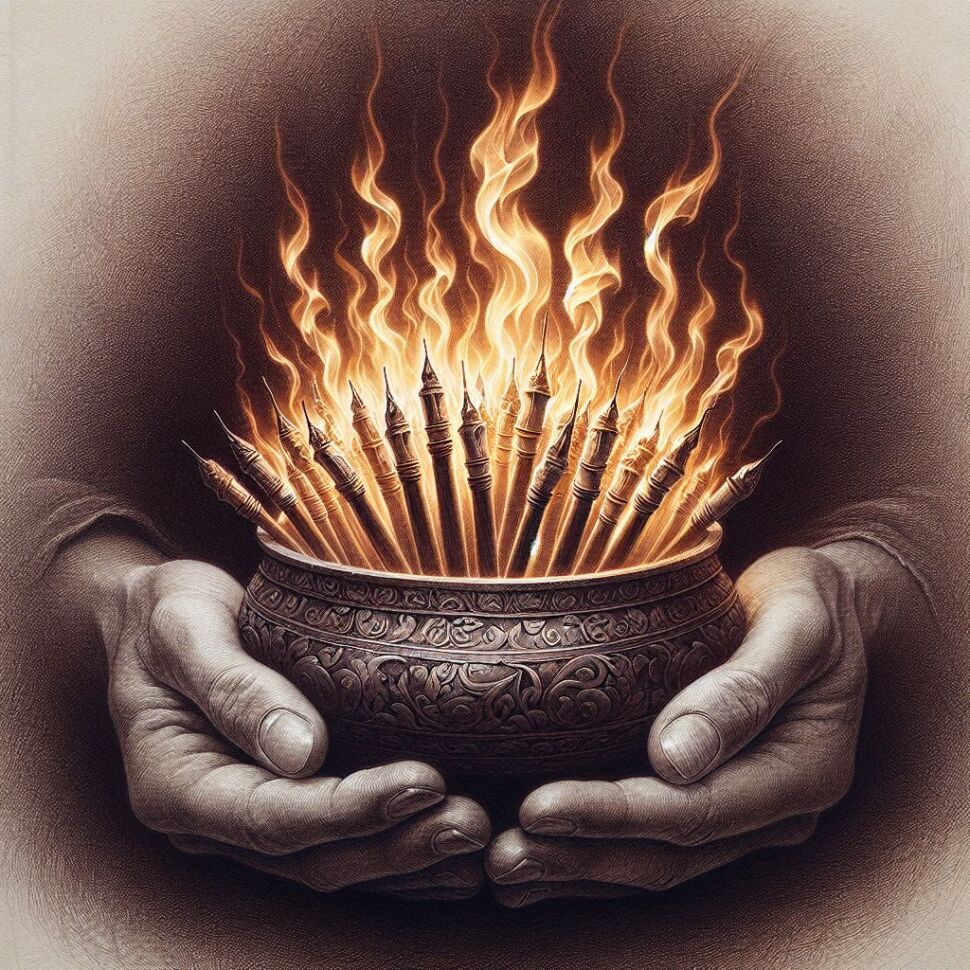Have you ever felt the strong urge to connect with something bigger than you? The desire to draw closer to God and go on a spiritual journey? Sacrificial Offerings have been cherished by believers for centuries, lighting up their devotion and leading them towards a transformative journey.
Understanding Sacrificial Offerings in Christian Faith
These ancient traditions, embedded in religious ceremonies and cultural practices, hold immense symbolic value and spiritual beliefs.
In the Bible, we see examples of sacrifices dating back to the Old Testament, where animals were offered as a way to atone for sins and seek forgiveness from God. These offerings were seen as a way to purify oneself and draw closer to God.
The concept of sacrifice was central to the life and teachings of Jesus Christ. Christians always believe that Jesus, through his ultimate sacrifice on the cross, paid the price for the sins of humanity and offered a path to salvation. This act of selfless love and sacrifice serves as a powerful symbol of redemption and forgiveness in the Christian faith.
The Cultural Significance of Sacrificial Offerings
Sacrificial offerings have played a vital role in religious ceremonies throughout history. They are not merely ritualistic acts, but a reflection of cultural traditions that have been passed down through generations. These offerings symbolize the devotion and reverence of believers, as they seek to connect with God.
Ancient Traditions and Symbolic Acts
The history of sacrificial offerings dates back to ancient times and can be traced to various civilizations. In Christian faith, these acts of sacrifice hold great importance, symbolizing the ultimate sacrifice of Jesus Christ for humanity’s redemption. The act of offering represents a profound commitment and surrender to God’s will, reflecting the teachings and example of Jesus.
“Sacrificial offerings are not just routine rituals. They are tangible expressions of our deep spiritual beliefs and dedication to God.”
The Spiritual Beliefs behind Sacrificial Offerings
Sacrificial offerings are rooted in the spiritual beliefs of Christians. They serve as a means of expressing gratitude, seeking forgiveness, and seeking God’s favor. The act of sacrificing something valuable, whether it be an animal or material possessions, represents a tangible demonstration of faith and commitment to God.
The Role of Sacrificial Offerings in Christian Faith
In the Christian faith, sacrificial offerings are seen as a way to honor God and seek spiritual purification. They are a tangible manifestation of one’s devotion and a reminder of the sacrifice Jesus made on the cross. These offerings are also a form of self-reflection, allowing individuals to examine their own motives, attitudes, and intentions in relation to their faith.
The Power of Sacrificial Offerings in Christian Worship
In Christian worship, sacrificial offerings hold a significant place. They are a reminder of the high holy days and the importance of reconciliation with God. Whether it is a trespass offering, a mandatory offering, or an act of repentance for unintentional sin, these offerings are seen as a way to connect with God on a deeper level and receive His divine grace and forgiveness.

Exploring Sacrificial Offerings in the Bible
The Israelites, in accordance with the laws of the Hebrew Bible, performed a range of sacrifices as part of their religious practices. These offerings played a crucial role in their spiritual journey and relationship with God.
| Sacrificial Offering | Purpose | Rituals |
|---|---|---|
| Sin Offering | To seek forgiveness and atonement for unintentional sins | Animal sacrifice with specific rituals involving the blood and the burning of certain parts |
| Burnt Offering | As an expression of devotion and surrender to God | Animal sacrifice completely consumed by fire on the altar |
| Grain Offering | Thanksgiving and acknowledgment of God’s provision | Offering of grain, oil, and frankincense on the altar |
| Peace Offering | Communion and fellowship with God and among the people | Animal sacrifice, with the meat shared between the worshipper and the priests |
| Purification Offering | Cleansing from impurity and restoration to ritual holiness | Animal sacrifice with specific rituals involving the blood and the burning of certain parts |
| Reparation Offering | Restitution and recompense for wrongdoings against others | Animal sacrifice, with additional compensation given to the affected party |
Each of these offerings served a unique purpose and had its specific rituals as outlined in the biblical text. They formed an integral part of the Israelites’ worship and their understanding of their covenant with God. Through these sacrificial practices, they sought spiritual nourishment, forgiveness, and restoration.
“And without the shedding of blood, there is no forgiveness of sins.” – Hebrews 9:22
The Significance of Sacrificial Offerings in Christian Worship
In Christianity, Sacrificial Offerings are a big deal in worship. These acts are seen as a way to atone for sins and seek forgiveness from God. This practice is based on the belief that sin creates a separation between humans and God, and that offering a sacrifice can help bridge that gap and restore a relationship with God.
During high holy days and sacred occasions, such as Passover and Yom Kippur, Sacrificial Offerings play a central role in connecting believers to their spiritual heritage and strengthening their relationship with God. These offerings serve as a tangible expression of devotion, repentance, and gratitude.
One type of Sacrificial Offering often mentioned in Christian scriptures is the sin or trespass offering. It involves bringing an offering to the Lord as an act of restitution for unintentional sin or harm caused to others. Through this offering, believers seek forgiveness and reconciliation, acknowledging the importance of personal responsibility and making amends.
Along with the trespass offering, there are some must-do offerings in the Mosaic Law that believers have to give to God. These offerings show obedience and respect, strengthening the promise between God and His people.
“For the life of the flesh is in the blood, and I have given it for you on the altar to make atonement for your souls, for it is the blood that makes atonement by the life.” – Leviticus 17:11
In simple terms, all those sacrifices back in the day were just a warm-up act for Jesus. He came, did His thing as the top priest, offered Himself as the ultimate sacrifice, and boom – no more sacrificing animals needed. He basically upgraded us to a better deal with His death and resurrection. Through His death and resurrection, the sacrificial system in the Old Testament was fulfilled and replaced by the new covenant of grace.
The Spiritual Practice of Sacrificial Offerings
Throughout history, sacrificial offerings have held a deep spiritual significance, serving as a form of ceremonial gift and acts of devotion in various ancient rituals and cultural traditions. These ancient rituals and religious practices have been passed down through generations, shaping the spiritual journeys of countless individuals.
The act of making a sacrificial offering is a powerful way to demonstrate one’s commitment and faith. It involves the giving of something valuable or meaningful as an offering to a higher power, showcasing reverence and gratitude.
“Sacrificial offerings have been a cornerstone of religious ceremonies and cultural traditions across different civilizations. They represent an intimate connection between the devotee and God, a tangible expression of devotion and surrender.”
Ancient cultures believed that by making a ritual sacrifice, they could establish a direct line of communication with the spiritual realm, seeking blessings, protection, or forgiveness. These sacred rituals were often accompanied by prayers, chants, and other rites, further heightening their spiritual significance.
Whether it was an animal sacrifice, the burning of precious herbs and incense, or the presentation of ceremonial gifts, sacrificial offerings were seen as a way to bridge the gap between the physical and spiritual realms. They represented a profound act of devotion, an opportunity for individuals to connect with their inner selves and God.

The types and methods of sacrificial offerings varied across different cultures and religious traditions. For example, in ancient Greece, animal sacrifices were performed to honor the gods and seek their favor. In Hinduism, offerings of flowers, fruits, and other symbolic items are made during religious ceremonies.
While the specific practices and rituals may differ, the underlying principle remains the same – sacrificial offerings are an embodiment of faith, a tangible expression of spiritual devotion.
The Transformational Power of Sacrificial Offerings
Rooted in ancient ceremonies and religious practices as we can read in the bible, these symbolic gestures hold the key to deepening your connection to the Christian faith and fostering spiritual growth.
Since ancient times, Sacrificial Offerings have played a key role in various cultures and traditions. People have always believed that giving something precious is a meaningful way to show love and respect. During religious rituals, Sacrificial Offerings are a physical way to demonstrate one’s dedication to their beliefs.
Sacrificial Offerings are not merely physical acts; they hold deep spiritual significance. They remind us of the ultimate sacrifice made by Jesus Christ, who gave his life as a symbol of love and redemption. Through imitating this act of selflessness, we can align ourselves with God and experience profound spiritual growth.
In the Christianity, Sacrificial Offerings are not limited to material possessions. They can also take the form of time, talents, and acts of service. By sacrificially giving of oneself, individuals can strengthen their relationship with God and their fellow believers, experiencing a deeper sense of purpose and fulfillment.
Romans 12:1-2 (NKJV)
“I beseech you therefore, brethren, by the mercies of God, that you present your bodies a living sacrifice, holy, acceptable to God, which is your reasonable service. And do not be conformed to this world, but be transformed by the renewing of your mind, that you may prove what is that good and acceptable and perfect will of God.”
Unlocking the Transformational Power
When engaging in Sacrificial Offerings, it is crucial to approach them with sincerity and humility. The act itself is not a transaction, but a heartfelt expression of love and devotion. It is through this genuine connection with the almighty Creator that transformation occurs.
As you embark on your own spiritual journey, consider embracing the power of Sacrificial Offerings. Reflect upon the ancient traditions and religious ceremonies that have shaped the faith of millions. Allow these symbolic gestures to guide you towards a deeper understanding of yourself, your faith, and your connection to God.
Remember, the path to transformation is a personal one, and it is through acts of devotion and sacrifice that we can truly encounter God.






